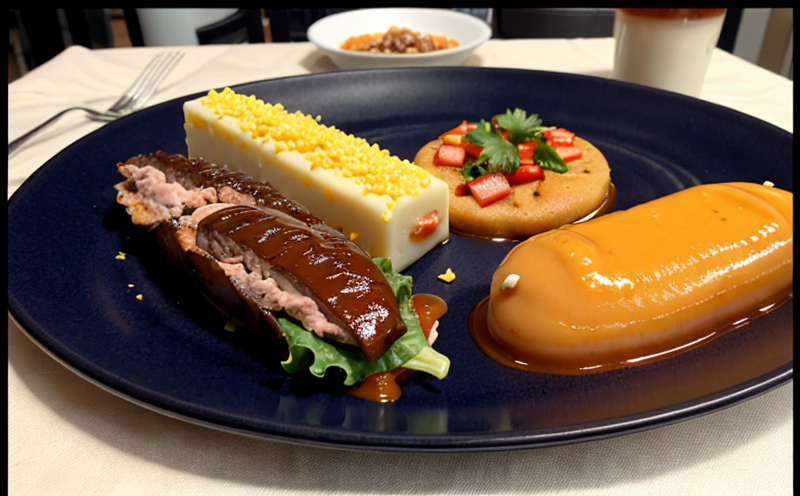EN 13130-7 Testing of Recycled Plastics for Food Use
The European Standard EN 13130-7:2016 specifies the procedures for testing recycled plastics intended to come into contact with food. This standard is essential in ensuring that recycled materials used in packaging meet the highest safety and quality standards, thereby protecting public health.
The increasing demand for sustainable packaging solutions has led to a significant shift towards recycling post-consumer waste into new products. However, the use of recycled plastics in food-contact applications requires stringent testing to ensure they do not migrate harmful substances into the food or beverages they contain. This standard provides detailed guidelines on how to test these materials comprehensively.
The testing procedure outlined in EN 13130-7 involves multiple stages that assess various properties and characteristics of recycled plastics, including mechanical strength, chemical stability, and compatibility with food products. These tests are crucial for manufacturers who aim to comply with regulatory requirements and ensure the safety of their products on the market.
One of the key aspects of this testing is the evaluation of migration behavior under specified conditions. This involves exposing the test samples to a range of environmental factors, such as temperature variations, humidity levels, and contact times, which mimic real-world scenarios during food packaging processes. The results help determine whether any potentially harmful substances could leach into the food or beverage.
Another critical component is the assessment of mechanical properties like tensile strength, impact resistance, and flexibility. These attributes are vital for ensuring that recycled plastics can withstand the rigors of production and distribution without compromising their integrity. Proper testing ensures that these materials perform reliably in both manufacturing and end-use applications.
The standard also emphasizes the importance of conducting thorough chemical analysis to identify any residual contaminants present in the recycled plastics. This includes checking for heavy metals, organic solvents, and other potentially hazardous substances that might have been part of the original waste stream from which these materials were derived. Ensuring low levels or absence of such impurities is essential for maintaining product safety standards.
Given the complexity involved in testing recycled plastics, it’s important to partner with a laboratory experienced in this area to guarantee accurate and reliable results. Our team at [Laboratory Name] has extensive expertise in performing these tests according to EN 13130-7, leveraging state-of-the-art facilities and skilled personnel to deliver precise outcomes every time.
By adhering strictly to the requirements set forth by this standard, we help our clients ensure they are meeting regulatory expectations while also promoting responsible waste management practices. This not only enhances brand reputation but also contributes positively towards achieving broader sustainability goals within the industry.
Scope and Methodology
| Aspect | Description |
|---|---|
| Sample Preparation | The samples must be prepared according to specified dimensions and conditions. This includes cleaning the samples thoroughly, removing any labels or other extraneous materials. |
| Mechanical Testing | This involves determining tensile strength, flexural modulus, and impact resistance using appropriate test methods like ISO 527-1 for tensile testing and ASTM D6641 for flexural properties. |
| Chemical Analysis | The analysis focuses on detecting trace elements and organic compounds that may have migrated from the recycled plastics into the food or beverage. Common tests include ICP-OES (Inductively Coupled Plasma Optical Emission Spectroscopy) for metals and GC-MS (Gas Chromatography-Mass Spectrometry) for volatile organic compounds. |
| Environmental Simulation | Samples are exposed to various environmental conditions such as high temperature, humidity, and contact time under controlled laboratory settings to simulate real-world usage scenarios. |
| Data Collection & Reporting | All data collected during the tests are meticulously recorded and analyzed. The final report provides comprehensive insights into the performance of the recycled plastics across different parameters. |
The scope encompasses all aspects necessary to evaluate the suitability of recycled plastics for use in food-contact applications. From initial sample preparation through final analysis, each step is critical to ensuring compliance with EN 13130-7 standards and maintaining product safety levels.
Quality and Reliability Assurance
Incorporating rigorous quality control measures throughout the testing process ensures that every sample tested meets strict criteria set forth by EN 13130-7. Our laboratories adhere strictly to internationally recognized standards, ensuring accurate and consistent results.
We employ highly trained professionals who possess deep knowledge in polymer science and food safety regulations. They utilize advanced equipment calibrated regularly against national standards to perform precise measurements and analyses. This commitment to excellence guarantees that clients receive reliable data they can trust when making decisions about their materials.
To further enhance reliability, we implement a robust quality assurance program that includes regular internal audits, participation in proficiency testing programs organized by reputable bodies, and continuous training for staff members on latest developments within the field of recycled plastics testing. By maintaining these high standards, we provide peace of mind to our customers knowing their products are being thoroughly evaluated before reaching the market.
Environmental and Sustainability Contributions
The use of recycled plastics in food-contact applications represents a significant step towards reducing waste and conserving resources. By incorporating post-consumer waste into new products, industries contribute to circular economy principles while minimizing environmental impact associated with virgin resource extraction.
Testing recycled plastics according to EN 13130-7 plays an integral role in advancing this sustainability agenda by ensuring that these materials are safe and effective replacements for traditional packaging solutions. Our laboratory services support companies in their journey towards more sustainable practices, helping them comply with environmental regulations while fostering innovation within the industry.
Moreover, by promoting responsible waste management through our testing processes, we encourage greater awareness among consumers about the importance of recycling and proper disposal methods. Ultimately, these efforts contribute to creating a healthier planet for future generations.





